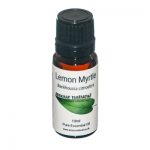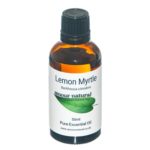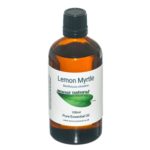





Lemon Myrtle Oil 10ml Amour Natural
£5.45 Original price was: £5.45.£4.90Current price is: £4.90.
Lemon Myrtle
Amour Natural Lemon myrtle oil is derived from the leaves of the lemon myrtle plant (Backhousia citriodora), a native Australian tree known for its aromatic leaves and lemony fragrance.
The oil is extracted through a steam distillation process and is valued for its pleasant scent and potential health benefits. Here are some key points about lemon myrtle oil:
1. **Aroma:**
– Lemon myrtle oil is prized for its strong and uplifting lemon fragrance. The aroma is fresh, citrusy, and reminiscent of lemongrass or lemon verbena.
2. **Natural Preservative:**
– Lemon myrtle oil contains antimicrobial properties, and its essential oil has been used traditionally by Indigenous Australians as a natural preservative for food.
3. **Antibacterial and Antifungal Properties:**
– The oil is known for its antibacterial and antifungal properties, which make it a popular choice for use in natural cleaning products, air fresheners, and personal care items.
4. **Aromatherapy:**
– Lemon myrtle oil is commonly used in aromatherapy to promote a sense of freshness, cleanliness, and alertness. It can be diffused, added to massage oils, or used in personal care products for its aromatic qualities.
5. **Culinary Use:**
– In addition to its aromatic properties, lemon myrtle leaves are used in culinary applications. The oil can be used sparingly in cooking and baking to impart a lemon flavor to dishes.
6. **Skin Care:**
– Lemon myrtle oil is sometimes included in skincare products for its potential antimicrobial and astringent properties. It may be found in products such as soaps, lotions, and facial cleansers.
7. **Natural Insect Repellent:**
– Due to its citrusy scent and potential insect-repelling properties, lemon myrtle oil is used in natural insect repellents and candles.
8. **Potential Health Benefits:**
– Some research suggests that lemon myrtle oil may have antioxidant properties, which could contribute to its potential health benefits. However, more research is needed to fully understand its therapeutic effects.
9. **Caution:**
– While lemon myrtle oil is generally considered safe for topical use when diluted, it’s essential to perform a patch test before applying it to larger areas of the skin to ensure there is no sensitivity or irritation.
10. **Quality Considerations:**
– When purchasing lemon myrtle oil, it’s important to choose a high-quality, pure essential oil from a reputable source. Look for oils that have been tested for purity and authenticity.
Always follow the recommended guidelines for dilution and usage provided by the manufacturer when using essential oils. If you have specific health concerns or conditions, it’s advisable to consult with a healthcare professional before using essential oils for therapeutic purposes.

















Reviews
There are no reviews yet.